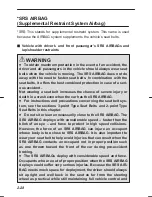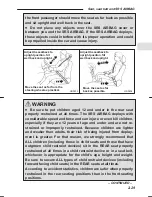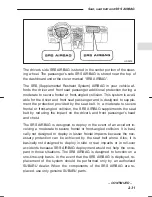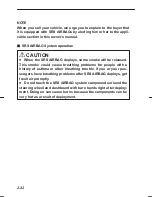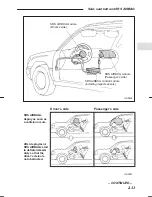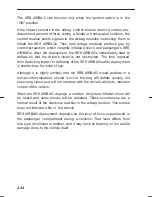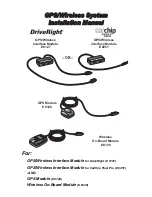
FORESTER NA. (E)
2-20
Seat belt safety tips
WARNING
D
All persons in the vehicle should fasten their seat belts BE-
FORE the vehicle starts to move. Otherwise, the possibility of se-
rious injury becomes greater in the event of a sudden stop or ac-
cident.
D
All belts should fit snugly in order to provide full restraint.
Loose fitting belts are not as effective in preventing or reducing
injury.
D
Each seat belt is designed to support only one person. Never
use a single belt for two or more persons — even children. Other-
wise, in an accident, serious injury or death could result.
D
Replace all seat belt assemblies including retractors and at-
taching hardware worn by occupants of a vehicle that has been in
a serious accident. The entire assembly should be replaced even
if damage is not obvious.
J
Infants or small children
Use a child restraint system that is suitable for your vehicle. See informa-
tion on “Child Restraint System” in this chapter.
J
Children
If a child is too big for a child restraint system, the child should sit in the
rear seat and be restrained using the seat belts. According to accident
statistics, children are safer when properly restrained in the rear seating
positions than in the front seating positions. Never allow a child to stand
up or kneel on the seat.
If the shoulder portion of the belt crosses the face or neck, move the
child closer to the center of vehicle to help provide a good shoulder belt
fit. If the shoulder portion of the belt cannot be properly positioned, a
child restraint system should be used. If that is not possible, the child
should sit in the center rear seat and use the 2-point type seat belt. Care
must be taken to securely place the lap belt as low as possible on the
hips and not on the child’s waist.























